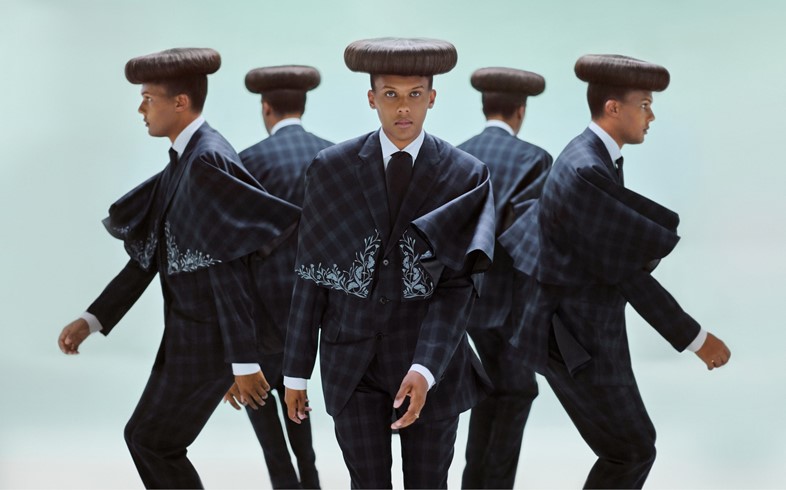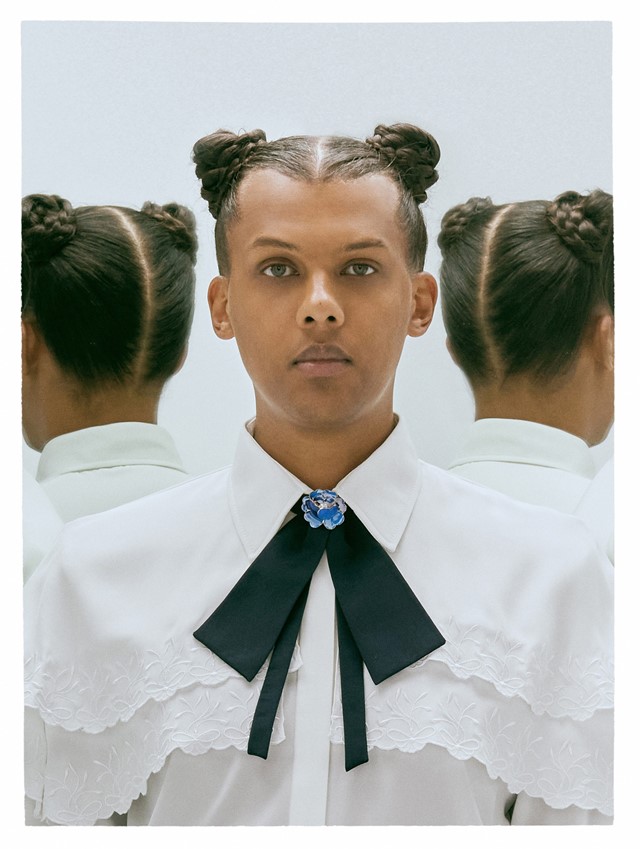The Belgian pop star soared to fame in the early 2010s before withdrawing from public life with depression – now he’s returned with a new album. Here, he discusses the record, his mental health and his viral performance on a French news channel
Belgian pop icon Stromae has returned this year with his first album since 2013, following a much-needed break. The artist also known as Paul Van Haver was dubbed “the most famous pop star you've never heard of” by Time Out in 2014, and it’s fair to say that he appeared to be huge everywhere except the UK. His music – an ebullient combination of ‘World’ influences and French chanson, peppered with droll, observational lyrics and powered by slickly programmed hip-hop beats and undulating basslines – dominated western European airwaves with songs like “Papaoutai”, “Formidable” and “Ta fête”.
He’d had a glimpse of massive success when “Alors on danse” went to number one in 11 countries in 2009 (even sneaking into the UK top 40). Then his second album, 2013’s Racine Carrée, became a cultural milestone in France: it sold a million copies within four months of its release, going on to shift a remarkable four million worldwide – practically a miracle in the streaming age.
Perhaps unsurprisingly, Stromae suffered a price for such ubiquity. The pressures of fame took their toll, and the musician suffered a prolonged period of depression, relinquishing his job as pop star aside from the odd engagement (such as a sell-out show at Madison Square Gardens in 2015, and a brief appearance with Coldplay on 2019’s “Arabesque”). To keep himself occupied during that time, he threw himself into making pop videos, collaborating on promos for emerging superstars like Dua Lipa and Billie Eilish with his production company Mosaert, assisting the director Henry Scholfield.
Stromae’s long-awaited third album Multitude is now with us. It’s a triumph of songwriting craft and fastidious production techniques, featuring Bulgarian choirs, charango players and practitioners of the erhu. On the record, he tells stories in the tradition of the chanson variété française, often from different characters’ perspectives, though he also writes from personal experience, most notably on the Jacques Brel-influenced chanson “L’enfer” (or hell).
To promote the single, Stromae appeared on French channel TF1 on January 9 with news anchor Anne-Claire Coudray. In a five-minute segment, he would go on to discuss the making of the album and some of the personal tribulations he’d experienced. Then something unexpected and bizarre happened: Stromae, sitting at a desk across from Courday in shirt and tie, burst into song: “I’ve had suicidal thoughts and I’m not proud of it,” he confessed, almost opera-like, as “L’enfer” premiered to a huge captive audience via the untapped medium of the news.
A collision of the worlds of music and current affairs was all too much for some. On that cold winter evening, French Twitter went into meltdown like I’ve never seen it. Users admitted to having been brought to tears, and thought-pieces aplenty naturally followed: Libération, in particular, decried a “publicity stunt” that blurred the lines of what’s acceptable in news broadcasting. We spoke to Stromae about Multitude, mental health and the ethical ramifications of conflating les actualités with infotainment.
Is there more pressure on you as an artist if you’ve not released anything for nearly a decade?
Stromae: Yes, because music evolves so fast. I just kept believing in myself and saying, ‘I’m just doing what I want to do and not following trends’. So that’s how I composed the album. But I had more pressure with Racine Carrée than Multitude because I was just a one-hit-wonder up to that point. It was difficult to focus and not hear people saying, ‘OK, you’re just a one-hit-wonder and you won’t have any other hits’.
You came back first with ‘Santé’ where as well as adding some charango [lute] on a song heavily influenced by cumbia [Colombian folk music], you also shifted the snares to quite an unnatural place in the bar – which takes a little getting used to. You’re like the Belgian J Dilla, aren’t you?
Stromae: I worked with a very good British producer on that song, Moon Willis, and it’s all helped thanks to the charango player, Juan Païo from Argentina. And yeah, Moon understood that that’s something I wanted to dig into, just because reggaeton has had the same beat for the last 20 years; I couldn’t do a beat exactly the same as the usual reggaeton. And so to me, it was important to put a twist on something like that and have this rhythm a little bit off-beat.
‘Santé’ seems to have a strong social conscience too, a raised glass to the people doing the jobs we don’t necessarily want to do. It felt particularly pertinent coming off the back of the COVID-19 pandemic, considering essential workers, often working-class people and immigrants on low pay: teachers, nurses, shop workers, were keeping things going…
Stromae: It’s not a tribute to the working class as much as it’s a tribute to the people who have difficult working conditions, or do night shifts or have a difficult schedule. I started my first lyrics with the name of the girl who cleans my home, Rosa, and I just wanted to raise my glass to celebrate Rosa, who cleans up after we’ve been partying. And then I started writing and thought let’s celebrate the ones who can't celebrate, actually.

You write from the perspective of various characters on Multitude, but ‘L’enfer’ seems to be coming from a very personal place…
Stromae: Yeah, that’s the way I felt, and obviously on that song I’m talking in the first person. This song is about struggling with mental health and I didn’t know that it would touch so many people, especially with the news section on TF1. I didn’t know it would be that big.
What do you say to publications like Libération that accused you of blurring the lines between hard news and what they called a publicity stunt, even if it’s an important subject you’re dealing with?
Stromae: On the night, we knew what the last question would be, and that was the signal to go into the singing, but otherwise it wasn’t rehearsed. Anne-Claire Coudray was just being a good journalist. And yeah, I was acting, but it’s the same when an actor comes in to promote his new movie. To me, there is no real issue, but I understand of course. Even before, I was thinking: ‘OK, maybe we’re going to have some criticism for this’, because people are not used to it.
Who comes up with an idea like that and how does it get implemented?
Stromae: My brother [Luc Van Haver] came up with it. He asked the people at the label, who asked TF1, and they were OK with it, even if, at the very beginning, they didn't really want to do it. And finally they accepted.
Because we’re so bombarded with information with the whole news cycle, do you think you have to come up with something like that to cut through?
Stromae: Yeah, I think so. We just asked, you know. If it’s a no it’s a no, but actually, they were OK with it and we were happy with that. I’m not in politics. If I was a politician then it would be unacceptable. I’m just a musician, you know, there’s no issue. That’s just my point of view.
You also spoke of having suicidal thoughts, which is still fairly taboo, so it’s important that we do have that conversation.
Stromae: It’s so interesting because I was so focused on mixing the master of the album and I wasn’t really paying attention to the lyrics anymore. I’d almost forgotten it was a serious issue. And then suddenly I’m walking the streets and people are saying, ‘Thank you for talking about this.’ In a lot of cultures it’s not really acceptable to talk about mental health, and with this pandemic, a lot of people’s mental health has really suffered. But it wasn’t planned. We were supposed to release another single first, but the video wasn’t ready so we put this out. None of it was planned, so it was a surprise!
I found the promo video to ‘L’enfer’ also very moving. It’s a medium you’re well versed in, isn’t it? Why did you decide to make videos instead of making your own music?
Stromae: I just wanted to not have to focus on me anymore. I didn’t want to be in the spotlight but I needed to keep working. So I thought the best idea was to work with other artists and for other artists.
Do you keep an eye on what’s going on in pop?
Stromae: Of course. Definitely. I’m a big fan of Adele, for example. I remember the first time I heard a song by Billie Eilish, it was in the Interscope offices in LA and I was with Olivier Nusse, the head of Universal Music France. I’d already said I didn’t want to do any music myself, and then they played Billie Eilish and I was like, ‘Whoa!’ They explained to me, ‘OK, she’s 16, she’s really talented’. I’m not sure if it was ‘Hostage’ or not, but I immediately fell in love with her work and actually she appreciates my work as well. So yeah, it was easy to do it.
Do you feel ready for the whole circus this time?
Stromae: I think so, but there’s definitely something not really natural about all this. Every time is different so it’s going to be a new experience. Now I’m more balanced. I have the sense to have a good team around me taking care of me and I’m really lucky for that.
Multitude is out now via Island Records









